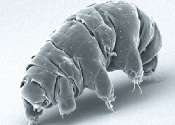Astrobiology is a peer-reviewed scientific journal covering research on the origin, evolution, distribution and future of life across the universe. The journal s scope includes astrophysics, astropaleontology, bioastronomy, cosmochemistry, ecogenomics, exobiology, extremophiles, geomicrobiology, gravitational biology, life detection technology, meteoritics, origins of life, planetary geoscience, planetary protection, prebiotic chemistry, space exploration technology and terraforming.
According to the Journal Citation Reports, the journal has a 2010 impact factor of 2.362.
- Publisher
- Mary Ann Liebert, Inc.
- History
- 2001–present
- Website
- http://www.liebertpub.com/publication.aspx?pub_id=99
- Impact factor
-
2.362
(2010)
Some content from Wikipedia,
licensed under CC BY-SA









